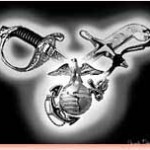Marine Corps Fraternization Policies
The Marine Corps fraternization policy is contained in Marine Corps Manual 1100.4.

"The relationship between officers and enlisted should in no sense be that of superior and inferior nor that of master and servant, but that of teacher and scholar." (Maj. Gen. John A. LeJeune)
Fraternization is the term used to describe improper personal and business relationships among Marines of different ranks or positions. When contact and relationships exceed these standards and become those of “buddies” or peers, then fraternization exists. Under the Marine Corps policy, commanders are instructed to look at the facts and circumstances of each case:
(1) Is there a compromise of the chain of command?
(2) Is there an appearance of partiality? (REMEMBER: when dealing with the subject of
fraternization, perceptions are as deadly as reality).(3) Is there the potential for good order,
discipline, morale, or authority to be undermined?
If the commander determines that the answer to any of the above questions is “yes,”
then he/she may determine that the offense of fraternization occurred.
Overview
The Marine Corps policy regarding fraternization is the product of naval service customs. The
Marine Corps specifically, and military society in general, has historically imposed social
constraints on personal relationships between individuals of different rank, grade, or position.
It is important to keep in mind that because customs vary between branches of the armed forces,
the Marine Corps’ view of fraternization can be different (stricter) than that of the Air
Force or the Army.
Discussion
Rules concerning fraternization. Fraternization rules date back to the time of the Roman army.
The purpose of such constraints is to:
(a) Maintain good order and discipline.
(b) Promote relationships of mutual respect and confidence between juniors and seniors.
(c) Prevent adverse impact upon a junior’s response to orders, the senior’s exercise
of command, or the perception of others regarding the senior’s impartiality.
(d) Preserve the integrity of the chain of command.
Definition of Marine Fraternization
Fraternization is a social or business relationship between Marines of different grades in violation of a custom of the naval service which, in the eyes of one experienced in military leadership, impacts adversely on good order and discipline, or degrades or at least threatens to degrade the character or status of the position that a Marine holds. Let us examine the parts of this definition in detail.
Some possible examples of activities encompassed by the term “fraternization” are:
- Playing cards or gambling together.
- Going to private homes or clubs together.
- Dating or engaging in sexual activities.
- Engaging in commercial transactions, except for one time sales or leases.
- Showing favoritism or partiality.
- Using one’s authority for personal gain.
Military court decisions and the Manual for Courts-martial make clear that fraternization can occur between enlisted Marines. The classic case involves an officer-enlisted relationship, but it is not the only case.
The key issue is whether a relationship has developed in which mutual respect of grade is ignored.
The relationship need not be male-female.
Though not a rigid test, normal social or business relationships between Marines within the following six divisions do not constitute fraternization. (However, under some instructor-student relationship, even relationships within a particular group, would be considered fraternization):
- General officers.
- Field grade officers.
- Company grade officers (to include warrant officers).
- Staff noncommissioned officers.
- Noncommissioned officers.
- Junior enlisted Marines.
While improper relationships within the same chain of command are the most obvious, there is no blanket requirement under the UCMJ that the relationship be within the same chain of command to be improper.
“Custom” is a long-established practice which, by common consent, has attained the force of law within the military.
The relevant custom within the Marine Corps is that “duty, social, and business contacts among Marines of different grades will be consistent with traditional standards of good order and discipline and the mutual respect that has always existed between Marines of senior grade and those of lesser grade.”
Improper personal relationships between Marines occupying different positions may influence the senior’s judgment as to mission accomplishment.
The threat to discipline and order need not be perceived by the parties involved in the fraternization. It is enough that the ill effects could be perceived by a reasonably prudent Marine experienced in military leadership. Thus, each case must be scrutinized by applying this “hypothetical leader” test.
The military services demand a regard for authority by juniors towards their seniors which experience has shown is enhanced by the observance of decorum, tradition, custom, usage, and conventions which are peculiar to the services alone. The unquestioned obedience mandated in time of battle rests on regard and respect for authority. This respect is lessened by the failure to observe niceties of military courtesy and other traditions and customs.
The Marine Corps cannot legally act to prevent marriages between service members. A marriage between Marines of differing grades will constitute fraternization when the impact of the marriage detracts or tends to detract from the respect due a senior, or is perceived by others to do so.
A marriage stemming from a previously existing improper relationship does not excuse those involved from responsibility for their activities prior to the marriage.
Possible Consequences of Fraternization in the Marine Corps:
a. Non-punitive administrative remedies.
(1) Formal or informal counseling.
(2) Transfer of one or both parties.
(3) Fitness report comments.
b. Non-judicial punishment (often followed, in the case of officers, by processing for
administrative separation).
c. Court-martial.
The responsibility for maintaining the customary and traditional standards of conduct lies with the senior. The line between acceptable conduct and fraternization will not be crossed unless the senior allows it to happen.
The leader must be careful to avoid even the perception of fraternization without destroying the traditional fraternal bond between Marines of all grades.
This should answer the questions:


